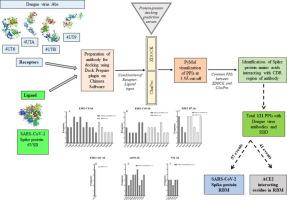当前位置:
X-MOL 学术
›
Comput. Struct. Biotechnol. J.
›
论文详情
Our official English website, www.x-mol.net, welcomes your
feedback! (Note: you will need to create a separate account there.)
Computational modelling supports that dengue virus envelope antibodies can bind to SARS-CoV-2 receptor binding sites: Is pre-exposure to dengue virus protective against COVID-19 severity?
Computational and Structural Biotechnology Journal ( IF 4.4 ) Pub Date : 2020-12-29 , DOI: 10.1016/j.csbj.2020.12.037 Himadri Nath , Abinash Mallick , Subrata Roy , Soumi Sukla , Subhajit Biswas
Computational and Structural Biotechnology Journal ( IF 4.4 ) Pub Date : 2020-12-29 , DOI: 10.1016/j.csbj.2020.12.037 Himadri Nath , Abinash Mallick , Subrata Roy , Soumi Sukla , Subhajit Biswas

|
The world is going through the scourge of the COVID-19 pandemic since January 2020. However, the pandemic appears to be less severe in highly dengue endemic countries. In this connection, several studies reported that sero-diagnostic tests for dengue virus (DV) yielded considerable false-positive results for SARS-CoV-2 and in dengue endemic regions, thereby indicating towards potential cross-reactivity between these two viruses. We anticipated that SARS-CoV-2 and DV might share antigenic similarity and performed computational docking studies to test this hypothesis. Our results predicted with high confidence that human DV antibodies can indeed, bind to RBD of SARS-CoV-2 Spike protein. Some of these interactions can also potentially intercept human ACE2 receptor binding to RBM. Dengue serum samples predating the COVID-19, had been found to cross-react with SARS-CoV-2 Spike and this provides direct experimental validation of our predictions. Our analysis also showed that m396 and 80R antibodies (against SARS-CoV-1) did not dock with RBM of SARS-CoV-2, a fact already proven experimentally. This confirmed reliability and robustness of our approach. So, it is highly probable that immunological memory/antibodies to DV in endemic countries may reduce the severity and spread of COVID-19. It is not known whether SARS-CoV-2 antibodies will hinder DV infections by binding to DV particles and reduce dengue incidences in the future or, augment DV infection and severity by deploying antibody-dependent enhancement.
中文翻译:

计算模型支持登革热病毒包膜抗体可以与 SARS-CoV-2 受体结合位点结合:预先暴露于登革热病毒是否可以预防 COVID-19 的严重程度?
自 2020 年 1 月以来,世界正在经历 COVID-19 大流行的祸害。然而,在登革热高流行国家,这种流行病似乎不那么严重。在这方面,一些研究报告称,登革热病毒(DV)的血清诊断测试对 SARS-CoV-2 和登革热流行地区产生了相当大的假阳性结果,从而表明这两种病毒之间存在潜在的交叉反应。我们预计 SARS-CoV-2 和 DV 可能具有抗原相似性,并进行了计算对接研究来检验这一假设。我们的结果充满信心地预测,人类 DV 抗体确实可以与 SARS-CoV-2 刺突蛋白的 RBD 结合。其中一些相互作用还可能拦截人类 ACE2 受体与 RBM 的结合。人们发现 COVID-19 之前的登革热血清样本与 SARS-CoV-2 Spike 发生交叉反应,这为我们的预测提供了直接的实验验证。我们的分析还表明,m396 和 80R 抗体(针对 SARS-CoV-1)不与 SARS-CoV-2 的 RBM 对接,这一事实已被实验证明。这证实了我们方法的可靠性和稳健性。因此,DV 流行国家的免疫记忆/抗体很可能会降低 COVID-19 的严重程度和传播。目前尚不清楚 SARS-CoV-2 抗体是否会通过与 DV 颗粒结合来阻碍 DV 感染并减少未来的登革热发病率,或者通过部署抗体依赖性增强来增强 DV 感染和严重程度。
更新日期:2020-12-29
中文翻译:

计算模型支持登革热病毒包膜抗体可以与 SARS-CoV-2 受体结合位点结合:预先暴露于登革热病毒是否可以预防 COVID-19 的严重程度?
自 2020 年 1 月以来,世界正在经历 COVID-19 大流行的祸害。然而,在登革热高流行国家,这种流行病似乎不那么严重。在这方面,一些研究报告称,登革热病毒(DV)的血清诊断测试对 SARS-CoV-2 和登革热流行地区产生了相当大的假阳性结果,从而表明这两种病毒之间存在潜在的交叉反应。我们预计 SARS-CoV-2 和 DV 可能具有抗原相似性,并进行了计算对接研究来检验这一假设。我们的结果充满信心地预测,人类 DV 抗体确实可以与 SARS-CoV-2 刺突蛋白的 RBD 结合。其中一些相互作用还可能拦截人类 ACE2 受体与 RBM 的结合。人们发现 COVID-19 之前的登革热血清样本与 SARS-CoV-2 Spike 发生交叉反应,这为我们的预测提供了直接的实验验证。我们的分析还表明,m396 和 80R 抗体(针对 SARS-CoV-1)不与 SARS-CoV-2 的 RBM 对接,这一事实已被实验证明。这证实了我们方法的可靠性和稳健性。因此,DV 流行国家的免疫记忆/抗体很可能会降低 COVID-19 的严重程度和传播。目前尚不清楚 SARS-CoV-2 抗体是否会通过与 DV 颗粒结合来阻碍 DV 感染并减少未来的登革热发病率,或者通过部署抗体依赖性增强来增强 DV 感染和严重程度。











































 京公网安备 11010802027423号
京公网安备 11010802027423号